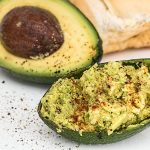Protein Power: It’s Not Just for Muscles (Part 3 – Brain Chem & More) by Joan Kent, PhD
Protein Power: It’s Not Just for Muscles (Part 3 – Brain Chem & More)
By Joan Kent, PhD
Part 1 covered physical benefits of protein beyond muscle building. Part 2 covered the benefits of protein in controlling appetite.
Part 3 covers brain chemicals, protein needs as we age, and a few suggestions for vegan protein.
Endorphins
Appetite is partly hormonal and involves CCK, but it can be affected by neurochemicals, as well.
One of those chemicals is beta-endorphin (typically called “endorphins”), made from the protein POMC. Endorphins increase appetite by inhibiting the function of the VMH.
Endorphins also promote a feeling of well-being.
Serotonin
Amino acids are the building blocks of protein, and adequate protein is necessary for brain chemical production.
One brain chemical that works as an appetite “suppressant” is serotonin, made from the amino acid tryptophan. Serotonin controls appetite by promoting satiety – either generally or specifically for carbs. A meal that triggers high serotonin – say, a high-carb lunch – will typically lead to a lower-carb dinner.
Other eating behaviors are affected by serotonin. When serotonin is low, food cravings may increase, and impulsivity may occur. A combination of the two means cravings may occur often and be difficult to resist.
Diets low in tryptophan have been shown to trigger depressive symptoms in susceptible people.
Adequate protein and timed carb consumption can help ensure normal levels of tryptophan and serotonin.
Norepinephrine and Dopamine
The brain uses the amino acid tyrosine to make norepinephrine and dopamine. Inadequate norepinephrine and dopamine can lead to poor focus.
Protein foods also contain vitamin B6 and other B vitamins. B6 is necessary for the production of serotonin, dopamine and norepinephrine.
Low levels of these three brain chemicals have been said to result in depression, the “blahs” or other mood issues, but it’s an area of some controversy. Yet clinical practice suggests that if your moods tend to be ‘down,’ you feel sleepy often, or you have strong cravings for carbs/sugar, boosting protein in your diet may help to normalize things.
To ensure optimal brain levels of these chemicals, eat protein with your meals and snacks throughout the day.
What About Protein Needs as We Age?
It may seem to follow that older adults need less protein because their muscle mass is often smaller. Exercise demands on their bodies are also assumed to be lower.
But that logic is faulty. Decreased skeletal muscle mass and strength contribute dramatically to increased mortality, morbidity and reduced quality of life in older people.
Because age lowers the rate of protein synthesis and makes it more difficult to process and absorb protein from foods, older individuals actually need more dietary protein, not less.
In adults past 50, protein needs increase from the very modest adult RDA of .8 grams of protein per kilogram of body weight. The recommendation for older adults is 1.0 or even 1.3 grams per kg. Highly active older individuals should consume between 1.2 and 1.5 g/kg.
Whey protein can be helpful for seniors because it’s high in leucine, which facilitates muscle growth. Whey comes from milk products. Leucine from plant sources appears to be less effective in muscle growth and repair, even when plant and whey sources are blended together.
Protein timing throughout the day reportedly matters, as well. Older adults are advised to eat about 30 grams of protein per meal, 3 times per day. A high-protein breakfast is particularly important.
What’s the Vegan Protein Solution?
Let’s keep this simple, although it might not be popular.
Lentils have 18 grams of protein per cooked cup and 40 grams of carbohydrate. The ratio isn’t ideal, but they are a source of protein.
Hemp seeds are primarily fat, of course, but they do have 11 grams of protein per 3 tablespoon serving. Doubling that would provide a full serving of protein, but the extremely high fiber content might cause digestive issues. It may be better to combine them with another protein food instead.
Nuts are not protein, despite the persistent myth. They’re good, healthful fats.
In fact, most nuts have more carbohydrate than protein. No one calls them a good source of carbs because they’re not. They have even less protein than that.
Quinoa is a healthful carb, not protein. The protein content is no higher than that of a potato.
Plant-based protein powders from hemp, peas, vegetables or brown rice may be helpful in providing adequate protein intake for vegans. Raw versions of some plant protein powders are available.
A future article will address vegan sources of protein in more detail.
Bottom Line
Whichever form of protein you choose, don’t skimp on protein. Be sure whatever you’re eating has enough protein to provide an adequate portion of it (20 grams or more).
Protein is important for body and brain in many ways. Don’t overlook it.
If you’d like help with protein intake or other nutrition concerns, just visit www.LastResortNutrition.com and grab your free Empowered Eating Consult. Find out how easy it can be to feel great.



